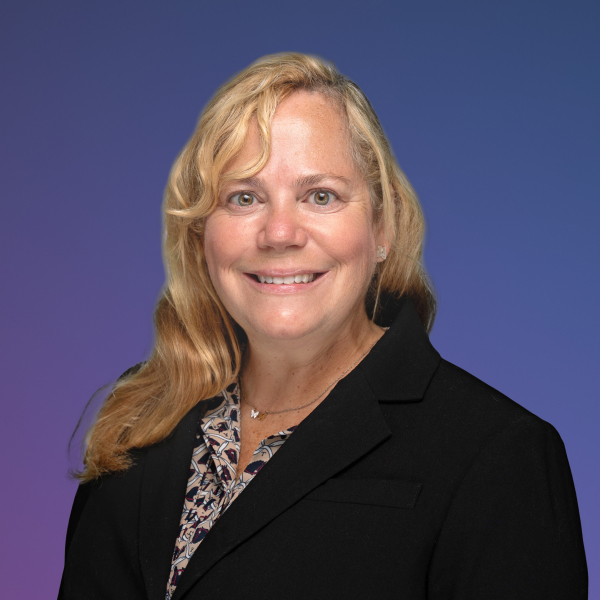Exhibiting trade secrets innovation and “relentless ownership” while launching rockets into space
August 26, 2024 | 5 min readBridget Smith is the AGC and Director of IP at Relativity Space, the rocket startup that’s “designing and building the next great launch vehicle.” With 16 years in private practice under her belt, Bridget brings deep passion and a seasoned approach to her fast-paced role in the trade secrets-heavy space industry.
Bridget sums up her job as being a trusted advisor in IP, which means leading everything from open source and patents to trade secrets, trademarks, and brands for “all the cool smart things that our engineers bring to the table.” “Cool and smart” might be an understatement, however, since Relativity doesn’t just build rockets. It 3D prints them. As a startup on the cutting edge of additive manufacturing, its first rocket was over 80% 3D printed. Called Terran 1 and launched in May 2023, it was the biggest 3D printed object to have ever been launched off Earth and made it to space.
“The culmination of my professional aspirations” — how the partner track prepared Bridget for startup leadership
Getting to lead IP at a startup was Bridget’s sole inspiration for going to law school. Originally a semiconductor engineer, it was “game over” when she joined a startup and saw the value a good IP lawyer could bring to them. “This is what I want to do for the rest of my life,” Bridget knew, but it would be another 16 years before her dream came true. Being a first-generation attorney, Bridget didn’t realize the rarity of opportunities to lead IP for a company. So when it did, “I just grabbed it,” Bridget says. “It was everything I ever wanted to do in life, the culmination of my professional aspirations.”
Bridget by no means regrets her experience in private practice, however, because it gave her her entrepreneurialism. “That relentless ownership mindset you need to learn as an associate and have as a partner rolls over so well when you work for a startup,” she explains. To Bridget, thinking like an owner means constantly seeking growth — being willing to experiment, make mistakes, learn, and iterate — and constantly asking how she can be of service to her clients and employees. As such, she thinks of herself as the CEO of the IP business within Relativity Space’s business, and “relentless ownership” is the defining trait she looks for when hiring.
For those considering a transition from private practice to startups, Bridget believes that you don’t have to wait: “As long as you have the spirit of adventure, curiosity, and the eagerness to solve hard problems, you’ll thrive.” At the same time, Bridget does report that it’s a big change: “I thought I’d seen it all at that point, that there was absolutely no IP issue I hadn’t tackled. But I hadn’t seen anything! Going in-house was not easy at all. It gives you a very different set of problems that you’re unlikely to encounter in private practice.”
IP in the space industry and Relativity Space’s unique trade secrets programming
The capital costs of being a startup in the space industry are “enormous,” which affects Relativity Space’s IP strategy. When painting the picture of these costs, Bridget quoted Carl Sagan who said, “If you wish to make an apple pie from scratch, you must first invent the universe.” Before Relativity Space could launch a rocket into space, it had to build an entire rocket factory, a complex and expensive endeavor. Because Relativity’s business is capital intensive, every patent decision is scrutinized heavily. Bridget characterizes them as asking, “Is this patent of service to my company? Or will the money be better spent toward the ultimate goal of getting that rocket up?” If you’re part of a team that gets to engage in speculative patenting, consider Bridget envious.
Instead of relying on patents alone, Relativity Space makes heavy use of trade secrets, a common practice in the space industry. Bridget spoke about trade secrets being one of her favorite parts of the job, and it shows. The two aspects of her trade secrets program she highlighted were unique and instructive as non-competes go away and trade secrets become more important in every industry.
Trade secrets registration Relativity Space has built and is expanding a system where employees can register trade secrets, something Bridget isn’t aware of other companies doing. Employees are incentivized to register their trade secrets just as they are to submit IP for patenting. To support this program, Bridget’s team invests heavily in employee education so they can spot IP worth registering. Bridget’s team is also exploring using AI to help them better document what they own and understand how it drives competitive value for the company. “AI is definitely an essential tool for harvesting IP in 2024,” shares Bridget. “And it’s just going to get better and better at reducing the time engineers need to spend on registering it.”
Avoiding litigation When teaching her workforce about trade secrets, Bridget views respecting other companies’ trade secrets as the other side of the coin of protecting their own. An initiative she’s spun up to balance internal and external protection is called “Don’t Talk About Your Ex,” with the “ex” in this case meaning an employee’s ex-employer. Go to a Relativity Space building, and you’ll see signs saying “Don’t talk about your ex” or “Swipe left on your ex” to remind employees to keep the confidential information they’ve learned at previous employers confidential. Don’t Talk About Your Ex isn’t just a unique trade secrets program, but also an illustration of how Bridget works to make raising “IP IQ” fun and relatable to Relativity’s young workforce.
Bridget’s take on KPIs and advice on being a woman in STEM and IP
When it comes to measuring the success of Relativity Space’s IP, Bridget doesn’t believe in hard metrics, something I found surprising: “It’s very important to me that we aren’t setting ourselves up to fail, so we don’t use KPIs for IP at Relativity.” Bridget elaborated by connecting this decision to the pace of change at Relativity: “If you say you’re going to do a number and then the business changes and that doesn’t make sense anymore, now you’re aiming for a KPI that just isn’t aligned with the business goals.” How does she measure success? An executive team that “sleeps well at night.” Bridget explains, “I’m satisfied when my executive team is. When they know about the big sources of IP risk, and I can tell them exactly what I’m doing now and in the future to address them.” As an advocate of KPIs for IP, Bridget’s answer reminds me that what’s best for certain teams will always be different.
When I asked how Bridget navigates being a woman in a male-dominated space, she reflected on her journey from having a chip on her shoulder to becoming confident: “Early in my career I worried a lot about not looking like an engineer or lawyer and people thinking I wasn’t good enough. But that mindset was not serving me at all. It led to shyness, hesitancy, and reluctance that held me back for a long time. I had to work hard to overcome that mindset, but once I rejected it, I had more faith in the people around me. Oftentimes, our assumption that people won’t think we’re skilled or qualified is false. I learned that, if I don’t worry and just walk in confident in my abilities, people recognize it right away.”
Bridget radiates energy when she talks about Relativity Space, her work at this exciting startup, and her path to getting there. Our conversation reinforced for me just how innovative IP attorneys can be and made me excited to continue following the rise of trade secrets in our industry.



